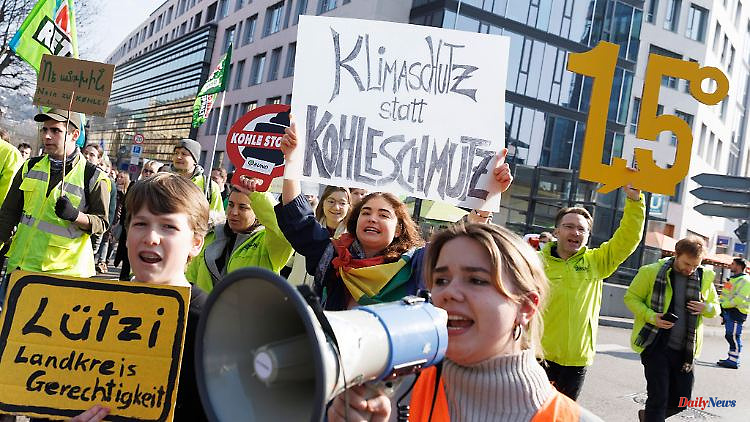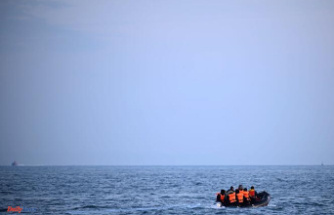Eerily empty platforms and packed streets, climate activists alongside trade unionists. Numerous protests paralyzed large parts of Baden-Württemberg on Friday.
Stuttgart (dpa/lsw) - Warning strikes in local public transport and climate protests led to traffic chaos in many major cities in Baden-Württemberg on Friday. Commuters in particular were put to the test at the end of the week. Well over 6,000 employees of local transport companies laid down their jobs, as Verdi announced on Friday. The union wants to increase the pressure in the collective bargaining conflict in the federal and local public services. Anyone who wanted to use public transport to get to work or school had to look for an alternative. Climate activists also took to the streets in more than 40 cities in the southwest. The groups sometimes ran together.
Verdi was very satisfied with the warning strikes on Friday. "We have a larger participation than in previous years," said Jan Bleckert from the state district of Baden-Württemberg. Subways, buses, trams, even a mountain railway and the ships on Lake Constance were at a standstill at the end of the week. "Everyone is there," said Reiner Geis from the Verdi district of Südbaden Schwarzwald. There, the Freiburg transport company was on strike, as was the Constance public utility company.
At the same time, one of the largest climate demonstrations in the southwest took place in Freiburg. According to Fridays for Future, around 9,000 people were out and about. The police estimated 6000. Under the motto "
Some of the rallies took place at the same time as Verdi's warning strikes. "There is a good reason why we are going on strike together today, because better pay is needed in the public sector," said Reiner Geis, Managing Director of Verdi Südbaden at the rally in Freiburg.
Violent criticism of Verdi because of the joint campaigns with Fridays for Future came from the Confederation of German Employers' Associations (BDA). The cooperation is "a dangerous crossing of borders," said BDA chief executive Steffen Kampeter of the German Press Agency in Berlin. Political or quasi-political strikes are illegal in Germany. Martin Gross, district manager of Verdi in Baden-Württemberg, firmly rejected this criticism. The fact that young people show solidarity with the strikers is their fundamental right to freedom of expression.
In addition to the climate protest in Freiburg, an action by the "last generation" also took place. The activists stuck to the lane that was still free for traffic on the federal highway 31 in Freiburg. So Fridays for Future ran on one track and the "Last Generation" stuck on the other. A police spokesman reported "traffic chaos". At times nothing happened at all. The warning strikes in local public transport also burdened the situation.
Many citizens have been feeling the effects of warning strikes in the public sector for weeks. Verdi and the civil servants' association dbb want to underpin their demands in the current wage round for the municipalities and the federal government.
The employers had submitted an offer in the second round of nationwide negotiations in Potsdam last week. The unions immediately rejected it. The offer includes, among other things, a pay increase of five percent in two steps and one-off payments totaling 2,500 euros. Verdi and the civil servants' association dbb are demanding 10.5 percent more income, but at least 500 euros more per month. The employer side had rejected the demands as "unaffordable".
The probably crucial third round is scheduled for the end of March. Verdi boss Frank Werneke had already said that a vote on a regular strike was "on the agenda" if the third round didn't bring a breakthrough.
On International Women's Day (March 8), Verdi once again called for warning strikes with a focus on social and educational services. Parents of daycare children will have to adapt to significant restrictions next Wednesday in Baden-Württemberg. In Stuttgart alone, two thirds of the daycare centers will remain closed, as Verdi announced. Strikes are going on in many other cities. The union expects more than 6,000 employees. It could be the largest day of strikes in the state so far, it said.












